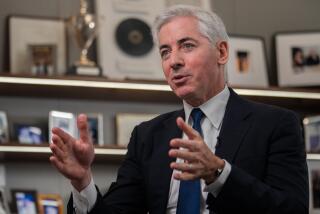Crowell Weedon’s $3-million trading loss is out of character
Even the most financially conservative companies can be tempted by the lure of fast money.
Crowell, Weedon & Co., a regional brokerage based in Los Angeles, has preached old-fashioned stock and bond picking to its clients since the depths of the Great Depression.
But the company recently lost more than $3 million on credit default swaps tied to the housing market, according to two people who were familiar with the matter but not authorized to discuss it.
The blowup occurred at a trading desk set up to make bearish bets on housing using the same kind of tricky financial instruments that nearly sank giant insurer American International Group Inc. in New York in 2008.
The brokerage fired not only the unidentified trader who made the wrong-way bet but also gave the boot to other, uninvolved employees as a cost-cutting measure in the aftermath of the fiasco.
Municipal bond expert Robert Gore, 54, Crowell Weedon’s head of bond trading and a member of the firm’s executive committee, set up the operation where the loss occurred. After 27 years in the securities business and 22 years at Crowell Weedon, he fell on his sword — retiring, he said, to write libertarian novels in New Mexico.
“Obviously the circumstances under which I leave were not the way I hoped to go out, and I apologize to both partners and employees for the substantial loss taken by a trader under my supervision,” Gore said in a July 11 departing email obtained by The Times.
The company declined to comment.
The firm’s net capital, more than $28 million as of April 30, is far in excess of regulatory requirements, and Gore said the company’s own money was used in the trading, so no client funds were lost or placed at risk.
Nonetheless, investment professionals seemed shocked that such a determinedly old-fashioned firm could be so wounded by risky derivatives that its head of fixed-income trading would have to resign.
“That’s really hard to believe,” said Stephen Kelleher, a bond trader and longtime acquaintance of Gore.
“What really surprises me is that Crowell Weedon, of all the firms out there, could have gotten itself into a situation like this,” said Kelleher, head of the municipal bond department at San Francisco brokerage Prager & Co.
Founded in 1932, Crowell Weedon bills itself as the largest independent investment firm in the West, with 14 offices from Fresno to La Jolla. It is headed by Andrew Crowell, grandson of co-founder Warren Crowell and son of Donald Crowell, who ran the firm for more than 30 years.
Andrew Crowell told The Times in 2007 that he subscribed to the approach of his predecessors: Buy high-quality investments and hold on to them, build a diversified portfolio and don’t try to time the markets’ swings because you won’t get them right.
Credit derivatives are notoriously volatile and were blamed for the vast losses that JPMorgan Chase & Co. sustained at a British office where trader Bruno Iksil became known as the “London Whale” for his market-busting bets. The trades cost the bank as much as $7.5 billion.
Gore and Crowell declined to disclose details of the trading losses at the private partnership, saying the information was confidential. “It’s not a public interest story,” Crowell said.
Two people associated with the firm, speaking on condition of anonymity because of career concerns, said managers initially estimated the loss at $3 million. Senior Crowell Weedon partners anted up their own money to help cover the deficit and imposed cost cuts that included firing some employees, they said.
“It’s very similar to what happened with the London Whale trader — except on a far smaller scale,” one said. “But for Crowell Weedon, it’s a huge trading loss.”
The other person, who also compared the blowup to JPMorgan’s trading debacle, said the loss estimate was later increased to as much as $4 million on an investment of $6 million.
In his blog, Straight Lone Logic, Gore describes how he began warning of a looming housing debacle in 2006, selling his house and advising clients — correctly — that a financial crisis was imminent.
He persuaded the firm to let him set up a proprietary trading desk to bet against housing. The operation started off with a bang in 2008, Gore said, then had mixed success in the following years. The results included solid profits last year on trades by an employee Gore had hired.
The same trader made the wrong-way bet in July, Gore said. He wouldn’t identify the trader.
In the interview, Gore acknowledged that derivatives trading had proved to be a tricky business. “I probably stayed bearish a little too long,” he said. “When you get it right it’s very profitable, but it’s difficult to stay right.”
Gore said the small brokerage and his trading operation would have fared better during the last few trying years had not the government bailed out Crowell Weedon’s major rivals and continued “doing everything they can to keep the house of cards from collapsing.”







